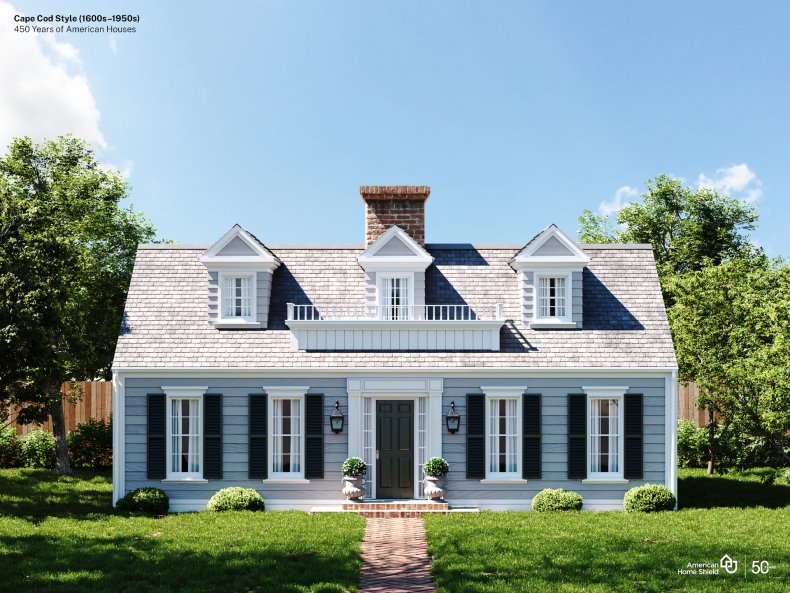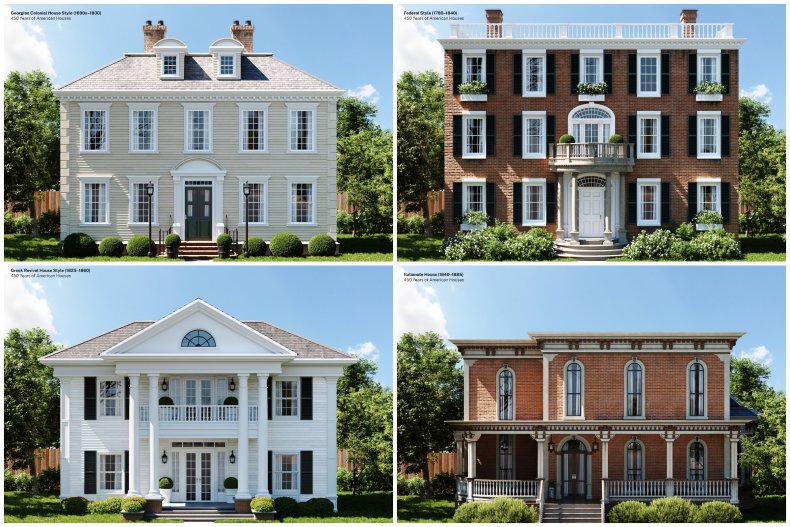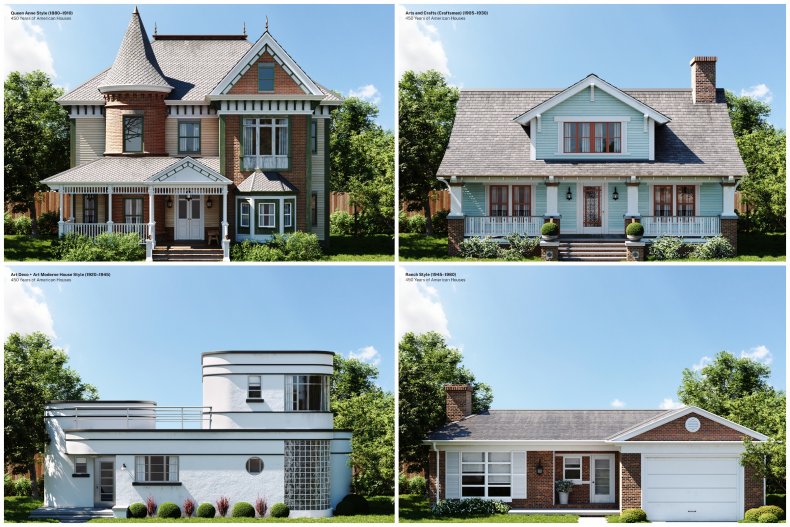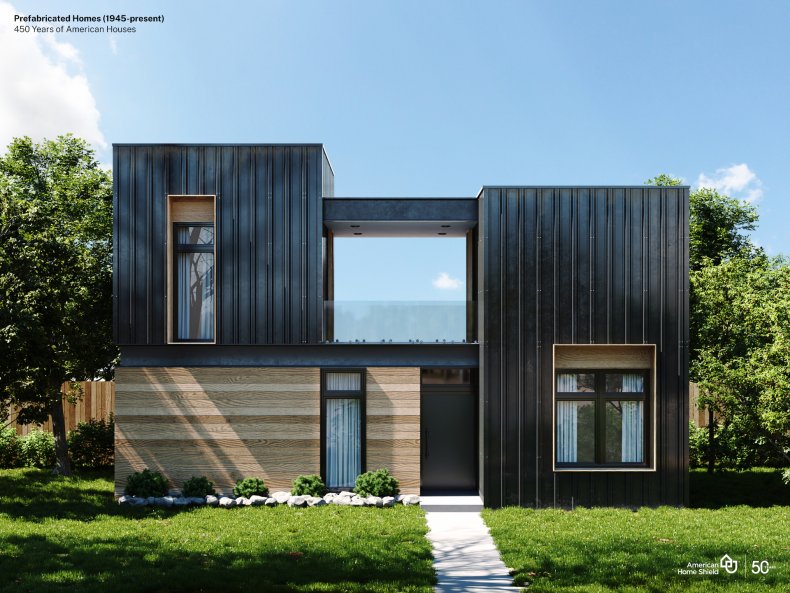The architecture and interior structure of American houses has regularly evolved around the several years (who could overlook ’70s carpets), but need for common, old-fashioned houses continues to be more powerful than ever.
Various social media accounts are now dedicated to renovating and restoring the first capabilities of outdated homes, as persons slide in adore with their rustic appeal.
Metropolitan areas now feature these grander residences sitting cheek-by-jowl with significant-increase properties and flats, as housing variations are adapting to match in with the modifying demographic.
Now American Household Defend (AHS) has brought to existence the unique variations more than the previous couple of centuries, charting how much houses have transformed because the 17th century, masking pivotal situations from the Civil War to the post-Globe War II little one boom.
The first edifice is the Cape Cod design and style of housing, initially seen in the 1600s, right up until finally the 1950s.
AHS points out that these had been first developed by Puritan colonists to face up to the harsh New England weather.
“They modelled their houses immediately after the fifty percent-timbered homes of their English homeland, but tailored the fashion to the stormy New England climate. About a few generations, a modest, just one to one-and-a-50 percent-story house with wooden shutters emerged,” they claimed.

American Property Shield
From the 1690s, up until the 1830s, the Georgian Colonial Property design and style emerged, named right after the four kings of Britain.
This style took notes from the British cities of London, Edinburgh and Bath, “as very well as things of classical Greek and Renaissance Italian architecture.”
The fashion, regular of “affluent tobacco planters” in the south, only turned a lot more typical in the north just after 1750, they observed.
The Federal style, also referred to as “Adamesque” and “Neo-classical,” can be found from around 1780, and was in vogue till close to 1840.
This was a pivotal minute, as AHS claimed: “Immediately after the Revolution, Us residents desired cultural as nicely as political independence, and they commenced to modify the design of their structures to replicate their improve of allegiance.”
From 1825 up until eventually 1860, the Greek Revival type was in full bloom, with the new region influenced by its European counterparts.
AHS spelled out: “As a new democracy, 19th-century Us citizens have been impressed by the birthplace of democracy and by Greek culture, artwork, and philosophy and all of the symbolism and indicating that it held for a country in the midst of defining alone. People in america began to reject the Federal style with its British influences and sought an American design with bona fide democratic roots.”
The Italianate design residences, well-liked from 1840 to 1885, wouldn’t seem out of place in a European village.
AHS said they evoked the experience of a “medieval villa rustica in the Italian countryside,” while they grew in popularity owing not to their structure, but very low setting up costs and toughness.

American House Shield
The Queen Anne model is possibly a popular sight in many neighborhoods, with it getting about as the most dominant establish through the previous two decades of the nineteenth century.
The fashion is usually defined by a entrance-dealing with gable, one-storey porch, towers and an asymmetrical condition.
From 1905 to 1930, the Arts and Crafts movement took off, as a “response to the produced and ornate variations of the Victorian age.”
AHS additional: “Arts and Crafts alternatively focused on the opposite–instead of mass-developed and uninspired, the movement was all about becoming handcrafted and own. The thought was that if high-quality could change amount, very good style and design and great flavor would prevail.”
From 1920 up until 1945, artwork deco was in year. A popular theme between community structures in the west, family households have been also created in the instantaneously recognizable model.
“Artwork Deco employs a model of decoration that was utilized to jewellery, clothes, furniture, handicrafts, and—in this case— buildings. Industrial designers utilized art deco motifs to enhance streamlined cars and trucks, trains, kitchen appliances, and several other machine-age innovations,” AHS said.

American Dwelling Protect
From 1945 up till 1980 the ranch design and style dwelling was well-liked, and it is really even now a familiar sight now.
AHS reported: “The Ranch type dwelling was the confluence of a number of American cultural and demographic developments, such as modernist style and design, westward expansion, and the submit-WWII inhabitants boom.”
Although they extra their one-storey design and straightforward products produced them perfect to meet the new demand for solitary-family properties.
Prefabricated residences, typically abbreviated to pre-fabs, popped up after Earth War II as a way of building homes promptly.
“As U.S. soldiers arrived residence from Environment War II and began to get started new households, the population expanded rapidly—creating an unparalleled need for new housing.
“1 way builders achieved this need to have was as a result of the prefabricated house, a property produced with relatively economical products off-website that is then shipped to the web site of its long-lasting residence,” AHS claimed.
Working with wooden paneling, sheet metallic and steel frames, their low price has witnessed them withstand the test of time, as AHS additional: “And as a new generation of young Us residents appear to settle down, the prefabricated property offers a single of the least expensive paths to homeownership—so really don’t be shocked if a new prefab property pops up in a community around you!”

American Residence Defend





More Stories
Luxury House Style Ideas That Redefine Elegance
Villa House Style Ideas That Feel Like a Vacation
Mansion House Style Inspirations for Grand Living